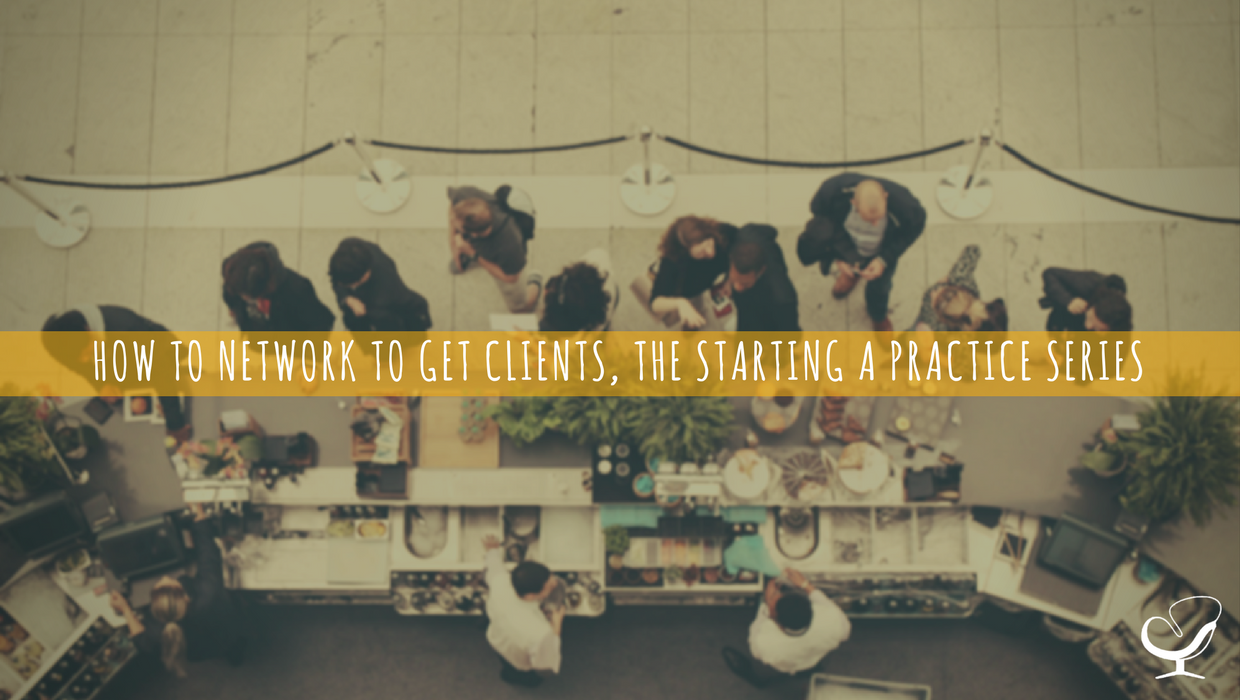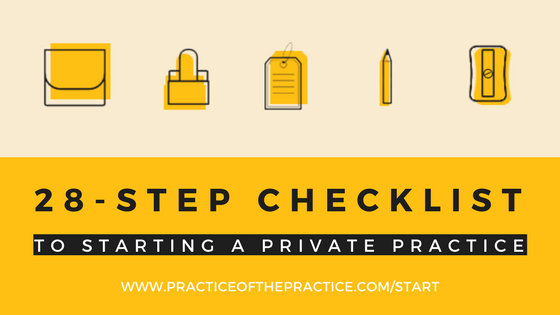Podcast: Play in new window | Download | Embed
In this episode, Joe Sanok speaks about how to network to get clients when starting a private practice.
Podcast Sponsor
Confused by all the advice on starting a private practice? I’d love to help. I put together a checklist of the top 28 things to do to launch a private practice.
In This Podcast
Summary
If you are in private practice and are under the $60 000 mark, this podcast series is for you! Joe is going back to the basics and running through the various phases involved in setting up a practice that is going to thrive! In this episode, Joe speaks about how to network to get clients.
Tips & Advice When Networking
When networking, just be yourself. Naturally, as a therapist, you are good at talking to people.
“In most situations, you are probably the most competent listener in the room.”
Keep track of your numbers, i.e.: how many people respond per 100 emails sent. When meeting up with people, be sure to ask a lot of questions. After you have met with them, be sure to follow up.
“Networking is authentic relationships and authentic referrals.”
Useful Links:
- 28-Step Checklist For Starting a Private Practice
- Podcast 91: Networking with 90 people in 90 days. An interview with Allison Puryear
- How to Make a Website? Starting a Practice | PoP 263
Meet Joe Sanok
Joe Sanok helps counselors to create thriving practices that are the envy of other counselors. He has helped counselors to grow their businesses by 50-500% and is proud of all the private practice owners that are growing their income, influence, and impact on the world. Click here to explore consulting with Joe.
Thanks For Listening!
Feel free to leave a comment below or share this podcast on social media by clicking on one of the social media links below! Alternatively, leave a review on iTunes and subscribe!
Podcast Transcription
File: PoP-264: How to Network to Get Clients
Duration: 0:11:10:08
[MUSIC]
Joe Sanok: This is the Practice of the Practice Podcast with Joe Sanok, session #264.
[MUSIC]
[INTRODUCTION]
Joe Sanok: Welcome to the Practice of the Practice Podcast with Joe Sanok. That’s me, Joe Sanok. So glad you are here, and we have been talking all about starting a practice. This is I think the 8th episode. So if you missed the previous episodes, go back and listen to them, they will walk you through exactly how to start a private practice. This series has been so much fun to do and today we are going to be talking all about networking. And all about just how do you network, so that you can get your ideal client without being kind of some slimy kind of guy… or girl for that matter. So really excited about today’s show. We are all about innovative ideas to start, grow, and scale private practices, and I’m surely glad you are here. Thanks for kind of letting me in your ears and into your brain whether you are running or walking or in a minivan or maybe you are doing the dishes or I have had a lot of what I have been calling nappreneurs – so people that are entrepreneurs while their kids nap. If that’s you, nappreneuers, I would love to see a picture of you working while your kids are napping. Tag me on Facebook all you nappreneuers. I think that’s a term that could really take off. So I don’t know why that cracks me up so much. Well, anyway so today we are talking all about networking. I remember it was a couple of summers ago, we have this National Cherry Festival, here in Traverse City, and the National Cherry Festival brings in anywhere from half a million to a million people to our small Northern Michigan town and there is air shows with like the Thunderbirds or the Blue Angels and carnival and pie eating contests and cherry pit spits… what else is there. Like our city like shuts down. We don’t even do mental illness counseling anymore because our office is right downtown and our clients can’t have parking. Everybody cancels and gets out of town if they don’t want to be around all that. We have fireworks at the beginning of the week. We have fireworks at the end of the week. It’s fun, but it is a mad house.
[TIPS AND ADVICES WHEN NETWORKING WITH EXAMPLES]
So there’s this one summer… actually it’s probably three summers ago maybe. Four?… Either way, one of the events was a business before hours where people, like business leaders got together to network before office hours. So it’s like 7 a.m. Was at this fancy-pants attorney practice downtown. So I wear a suit and I don’t think I wear a tie, but probably buttoned up… and nobody was talking to anybody other than people that they were talking to, like they weren’t kind of working in the room. It was just the people they already knew. And I am just like standing there. And everyone is in their circles. And I am just looking for anybody that I know and there is nobody I know there. And usually I am pretty good at just like starting up conversations with people, but that morning felt really weird. And there is this one guy, Andy, who is kind of standing off to the side. He was in a suit and a tie. He started talking. And he is an attorney at this fancy-pants – lawyer, attorney firm. And we get talking. He’s just like a cool guy. And likes water skiing, has young kids. And he and I just talked the whole time and ended up going out for breakfast. And he actually became my attorney because of that. But we have all been in those situations or if we haven’t we are terrified of them where you go to some networking event, the people that stand out are the ones that are like working the room and throwing their business cards at everybody and they… ha, it’s just weird. I remember I was at this how to network event for young professionals. I was speaking at it. I thought, well, I’ll go to some of the other sessions as I am already here. And this one guy. You [00:04:30.03] your business card and instead of saying, “Hi, I am Joe, what do you do?” You know, kind of more natural, he goes, “Say what you do first and then say your name.” So you [00:04:39.24] speak like, “Therapist, Joe Sanok,” or “Business Consultant for Private Practices, Joe Sanok.” And like, that’s the weirdest thing ever. Like if somebody did that to me, I would like, who are you and I want to stop talking to you right now. But this guy’s thing was like so weird like that.
We do not want to be weird, do we? That’s so not us. So how do you do it? I just spent 5 minutes telling you stories of terror from networking. The flow that I found that works is, just remember, like be yourself. You are a therapist. You know how to talk to people. You are good at talking to people. In most situations, you are probably one of the most competent listeners in the room. So use that to your advantage. I will highly recommend when you are first starting out to just say to people, I would love to come see your practice. And so to email, say a naturopath or a massage therapist or another therapist that’s outside of your specialty or even in your specialty, “Hi, I am Joe Sanok. I just opened mental wellness counseling. We specialize in working with angry kids. I would love to come see your office and bring coffee or Kombucha, and hear more about the work you are doing. From your website and from you reputation, it sounds like your work with parents and couples and that’s really clear from your website. And those are kind of people that I will probably be referring to. I would love to see your space and just get to know you a little bit.” Now, I’ve found that probably 80 percent of people just don’t even return the email which to me is really sad. But you know they are just too busy or they don’t want to network or it goes to their spam. Whatever. But then of that remaining amount, maybe one out of ten people that reply, it will actually work out to work and go chat with, which aren’t always great numbers. So keeping track of your numbers, if you send a 100 emails, how many people follow up and say, yeah, let’s get coffee, I would love that versus don’t. So each person’s numbers might be a little bit different and your community might be a little bit different. So then you go to that person’s place. I would ask him tons of questions about what they do. So tell me about who you serve. Tell me about your intake process. Tell me about how you got into this business. And then they will actually ask you questions or they might not, but if people feel like you genuinely care about them, they are going to leave that conversation feeling connected. I was at this party recently and there was this couple that was just standing over to the side by themselves. My wife was hanging out with some of her friends and there were a ton of people I knew, and so I thought, well, I am just going to go talk tp this random couple. And they were both Principal French Horn for a Symphony in Texas. And I was like, what! You both play French Horn and you are both in the same Symphony in Texas. And so I was like, so is one of you first chair and the other second chair. I like, do you have to like challenge each other. And they are like, no, we actually both were hired as the Co-Principal French Horn players, to which I followed up with, so is the French Horn world very competitive. And they said, oh, yeah, it’s very competitive. And I was, do you like living in that town in Texas. And they said, no, we’re kind of here from Michigan and Connecticut. And then as we talked, I said, well, like how do you leave Texas. They said, well, we want to keep playing French Horn, so we have to find a bigger Symphony. To which I asked, so if Symphonies were like graded and like, I don’t know, the [00:08:23.17] in Chicago was like an A, what level this Symphony be. They are like, oh, it would be like a C. I said, well, what are B ones? And they are like, well, St. Louis. So how do you get into playing French Horn in St. Louis. Well, they have these blind auditions where they don’t even [00:08:46.11] networking doesn’t matter and you do these blind auditions. And I said, so do you fly there and you are like sitting behind a screen or do you submit like a audio [00:08:58.26] to being like an MP3. So, no, no, no. You fly there, they give you a piece of music that you may or may not have seen and then you play it on the spot behind a screen. I like, like a dating show? And they’re like, oh, yeah, exactly like a dating show (laugh).
So one interesting conversation… and I actually kept asking them questions because I was so fascinated, I said to them at one point, I am sorry for asking so many questions, but I feel like this window into the French Horn World has just been opened. I felt like one of those movies, one of those mockumentaries. It was just fascinating to me. But you think if I can have a conversation with two Principal French Horn players for probably 25 minutes to half an hour, in an area that I literally no nothing about, it may get interesting for everybody you can do the exact same thing with anybody too. That’s all that networking is. If only to find out interesting stories of how people got in the field and ask her a couple of questions that maybe someone wouldn’t ask, you get to know people, and then after that you want to follow up. Write them a thank you card, send them your business card, and there maybe follow up in two or three months, and say how is it going and do an email or you know have coffee again.
[CONCLUSION]
That’s what networking is, is authentic relationships, and authentic referrals. So go and network. Go do it. We are going to start talking about some private pay versus insurance a little bit in the next one, and then what to charge especially if you are private pay, and then we are going to move into systems to help you grow in scale. All right.
Thanks for letting me into your ears and into your brain. You guys are amazing. Head on over to www.practiceofthepractice.com/start to get that 28-step checklist, the free 5-minute video on assessing practices in your town and then those paced out emails are going to give you action to stay organized and to grow faster. Thanks so much. I will talk to you soon.
[MUSIC]
Special thanks to the band Silence is Sexy for Intermusic, and this podcast is designed to provide accurate and authoritative information in regard to the subject matter covered. It’s given with the understanding that neither the host, the publisher or the guest are rendering any legal, accounting, clinical or other information. If you need a professional, you should find one.
[MUSIC]
[END OF PODCAST 00:11:32.20]



